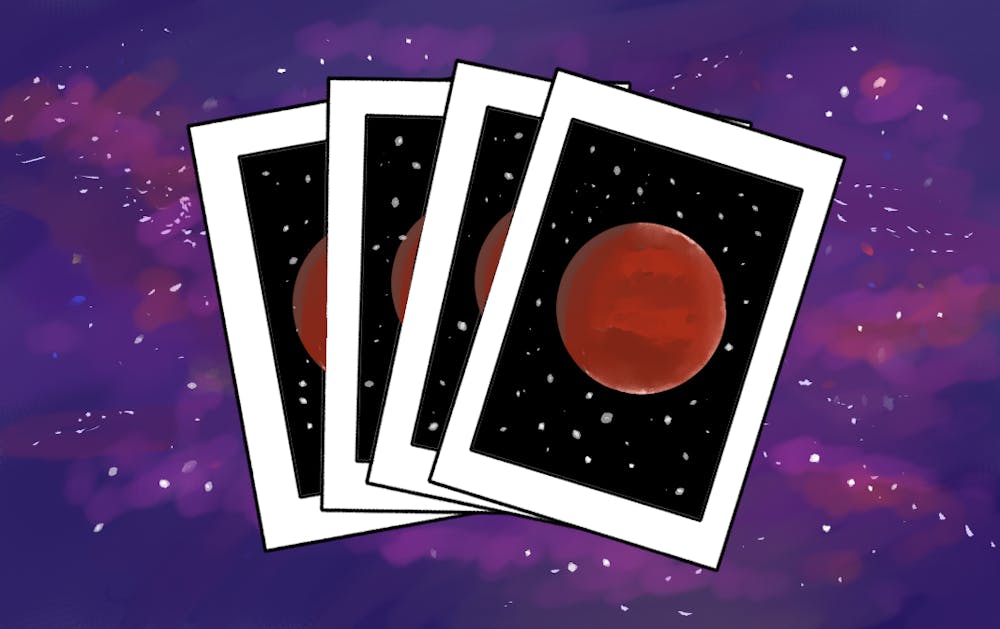The conversation surrounding life on Mars is often centered on the technological aspects of relocating, and ASU researchers wonder if society could handle it.
A new experiment conducted by the Interplanetary Initiative at ASU examines how humans would potentially operate with each other on Mars through the use of a card game.
“Port of Mars” is a card game that aims to analyze how humans would react to life on Mars, including the social, political and cultural norms regarding space exploration.
Lance Gharavi, the project lead and an associate professor at the School of Film, Dance and Theatre, said it examines how people would react in conditions with uncertainty and risk.
Gharavi said he became curious about what a sustainable, healthy, Martian society would look like. From there, "Port of Mars" was born.
"Some of the thorniest challenges of human space exploration aren't technological. They're social," the project's website says.
Rounds of experiments testing the card game began earlier this year. Groups of five voluntary ASU participants play the card game, and their decisions are monitored by researchers.
"It's is a science experiment disguised as a game," Gharavi said.
Michael Yichao, the designer of the game and a narrative writer for Riot Games, said the game consists of five players that are grouped together to carry out unpredictable conditions through the use of cards and decision making.
Players must work together while also competing for the win. Each of the five players must divide their time into either community upkeep or personal gain.
Yichao said players must determine how much time is spent on influence — so they can win the game — while also spending enough time on upkeep that the planet stays alive.
“The mission was to craft a game that put players in a situation where they would have to make personal goals against goals of preserving the group good,” Yichao said.
Each player in the game has a role of either a researcher, curator, pioneer, politician or entrepreneur, and they can use their time in the game to make an influence in legacy, politics or science.
Community upkeep for the game includes maintaining the space station, growing food, doing repairs and more. The five players must work collectively to carry out these missions in order to keep the planet from falling apart, according to Yichao.
Random event cards are included, which include events such as a dust storm hitting the planet, Yichao said.
Yichao added that the game aims to give each player the opportunity to form their own relationships and governances while interacting with each other. The card game aims to go digital by March 2020.
Allen Lee, an academic professional for the Center for Behavior, Institutions and the Environment, is one of the developers for the digital version of the game.
The developing team for the digital version consists of five people that include senior developers and ASU graduate students, he said. Lee said that the digital version of the game will be tailored specifically toward ASU students, and players will only be able to play the game through their ASU login.
“It’s a fun project and we’re pretty excited about building it,” Lee said. “It’s inspiring to be able to work on projects that you care about.”
“Mars Madness” is a tournament that plans to showcase the newly-made digital game. The tournament will be held in the spring where more students can play the game and more data will be collected, Gharavi said.
The data collected will not only discuss life on Mars but will also be applicable to life on Earth, he said.
Gharavi said that knowledge produced from this experiment will be applicable to similar problems on Earth, such as cybersecurity, mass migration and climate change.
“We’re very cognizant that the research we are doing and the findings that our research is producing are relevant to addressing terrestrial problems that we are having right here on this planet,” Gharavi said.
Reach the reporter at mfsadegh@asu.edu and follow @SadeghiMckenzie on Twitter.
Like The State Press on Facebook and follow @statepress on Twitter.




